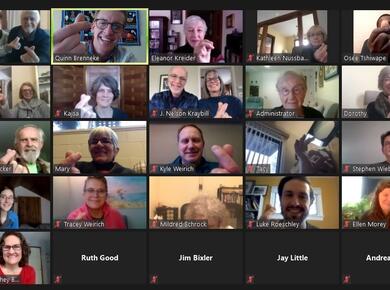Posted: April 22, 2021
The Anabaptist world has changed immensely since the first assembly the Mennonite World Conference (MWC) organized in 1925. Our world family has witnessed a numerical transformation in ethnic, geographic and linguistic terms.
Our current cultural diversity is fantastic. Whereas in MWC’s early years, the dominant language was German and world assemblies were held in Europe and North America, today we try to produce all our materials in MWC’s three official languages: Spanish, English and French. We have many documents in other languages, and our assemblies rotate across five continents.
Such global growth has occurred in contexts other than those of the Anabaptist faith. The encounter with the world’s religions has been inevitable and wonderful at the same time. Our fundamental belief in Jesus Christ as Lord and God as a normative paradigm for the human being and the way to the Father has led us to ask ourselves how to interact with the religions surrounding us.
Unfortunately, the Christian church has not always left a very encouraging record of its encounter with the world’s religions. Stories of violence, oppression, colonialism and religious abuse are well known. As Anabaptists, do we have anything to offer regarding meeting other faiths?
In this Courier, we share some learnings from our global community in its interaction with world religions. The stories related here speak to us of the need to present Jesus Christ from our perspective as witnesses of who he is and has done in our lives. Such testimony has the following characteristics, among others:
1. It is offered in community and interdependency
A testimony that provides tangible examples of forgiveness, reconciliation, love and cooperation has an enormous impact on our encounters with other faiths. While cultural, gender, political and economic differences divide, faith in Christ makes new humanity possible.
2. It is offered taking into account the human being as a whole
Our encounter with Christ completely transforms us. That is why our testimonies include community development, conflict resolution, church planting, restorative justice, education, counselling and health ministries, among other things. In the person of Jesus, God is interested in the human being in his integrality, and we bear witness to that reality.
3. It is offered from an inclusive position
A testimony that privileges one race or social sphere over another is not consistent with the person of Jesus. Our witness to the love of Christ leads us to value all cultures, avoiding patterns of social domination. Every human being is invited to join us at the communion table and enjoy a relationship with God.
4. It is offered from a vulnerable position
Our testimony is not presented from an arrogant or superior position. We know from our own experience how God cares in a particular way for those most in need and sometimes excluded by society. In our witness, we unite with God in that walk.
As witnesses, our role is not to convince the other. In our encounter with the world’s religions, we are called to unite ourselves to what God is already doing in those contexts and, with humility, share what God has done for us in the person of Jesus.
However, our encounter with world religions has not always been consistent with our faith. We recognize that many times we have made mistakes that hurt others and negatively affected our testimony.
We pray that this issue of Courier may encourage and challenge us to be faithful witnesses. May the Spirit of God guide us to continue discovering in practice the implications of following Jesus in the multi-religious context in which we find ourselves!
—César García, MWC general secretary, originally from Colombia, lives in Kitchener, Ontario, Canada.

Join the Conversation on Social Media
FacebookTwitterInstagramFlickrYouTube